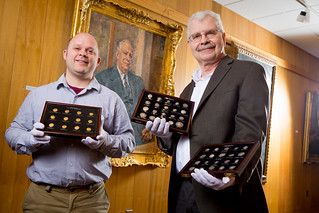
PREV ARTICLE
NEXT ARTICLE
FULL ISSUE
PREV FULL ISSUE
THE THOMAS B. LOCKWOOD COLLECTION
A library in Buffalo has rediscovered a coin collection in its holdings. Thanks to Tom Kays, Arthur Shippee and others who sent this in.
-Editor
Three years later, Kiernan, an assistant professor of classics, channeled his inner Indiana Jones and journeyed to the depths of the UB archives to find them. The collection, he was shocked to learn, was real: 40 silver Greek coins, three gold Greek coins and a dozen gold Roman coins — one from each era of the first 12 Roman emperors, from Julius Caesar to Domitian. They range in date from the fifth century B.C. to the late first century A.D. Not your usual find. “I must have been the first person to touch them in almost 40 years,” says Kiernan, who brought in two experts to verify the coins’ authenticity last semester and is now developing a graduate course to examine the items’ history. It’s the first time the coins will be extensively studied, and Kiernan and his class will publish their findings.
The Greek coins were struck by some of the most powerful city-states and rulers of the ancient world, such as Athens, Corinth and Alexander the Great. The coins were donated in 1935 to the UB Libraries Special Collections by Thomas B. Lockwood as part of a larger collection of rare books. However, it wasn’t until Kiernan examined them out of curiosity that the currency’s rarity and value were realized. Kiernan focuses much of his research on ancient currency and antiquities, and the experts he brought in to examine the coins were numismatists — people who collect or study currency. Lockwood’s collection includes more than 3,000 books, medallions and additional coins from early America and England. Other notable items include a medallion of Napoleon Bonaparte and 36 British gold coins, including one of Queen Elizabeth I. Lockwood, an avid reader and collector of rare and special books, purchased the items to supplement his personal collection. Accruing relics and art was common practice among affluent men in the early 20th century. The UB Libraries will open the collection of coins to members of the campus and local communities pursuing relevant research. 
I'm curious to learn more about the "medallions and additional coins from early America and England". Sounds like Lockwood
had great tastes. Nice story, but it doesn’t reflect well on the library, though. The collection could have been stolen years ago and
they wouldn’t have known a thing. -Editor
Tom Kays writes: The library plans to "conserve" the coins, a red flag word for "harshly clean" in my lexicon. Ancient gold coins in high grade need no library conservation. Along with the coins the gift included rare books (rare for 1935) which may include books about numismatics since the benefactor had exquisite taste in antiquities and coins. That might be worth a call to the library to see if they can identify what else was donated with the coins. Do any E-Sylum readers know more about this collection based on contemporary auction catalogs? Do any librarians within the call of The E-Sylum have similar objects sitting back in the stacks of their institutions? I know I found tokens in the stacks of the Alexandria Library on Queen Street, rare books room, but don't want to say more in the hope that they stay put for the benefit of future researchers. Apparently holding artifacts among ephemera is standard practice at libraries. Even coins. Even valuable (not priceless in the monetary sense) coins, deemed priceless in this interview from a historical standpoint with which I agree. Librarians - show us your numismatic artifacts (in an anonymous and secure manner please). To read the complete article, see:
Wayne Homren, Editor The Numismatic Bibliomania Society is a non-profit organization promoting numismatic literature. See our web site at coinbooks.org. To submit items for publication in The E-Sylum, write to the Editor at this address: whomren@gmail.com To subscribe go to: https://my.binhost.com/lists/listinfo/esylum All Rights Reserved. NBS Home Page Contact the NBS webmaster 
|

